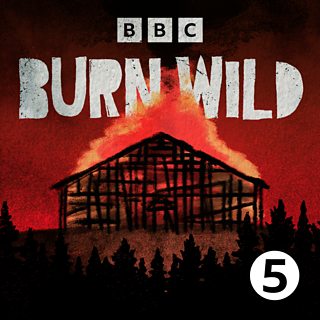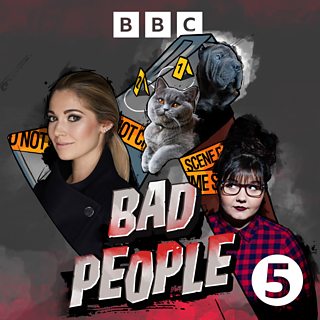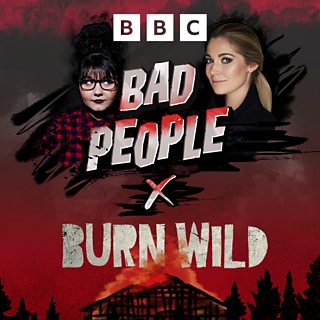How far is too far to save the planet?
Written by Dr Julia Shaw, a research associate at University College London and the co-host of the Bad People podcast on Βι¶ΉΤΌΕΔ sounds.
By now, you have probably heard of the soup-throwing eco-activists.
If not, let me catch you up. Last week, activists from the group Just Stop Oil tossed two tins of soup over a famous painting in the National Gallery in London. They then glued themselves to the wall below the painting.
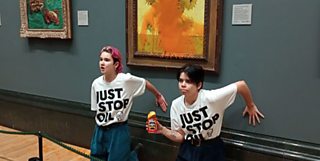
As the orange soup slid down the glass covering Vincent van Gogh’s Sunflowers, the activists challenged us to reconsider our priorities. Are we spending too much energy on luxuries, while spending too little time protecting our planet?
The stunt has had mixed reactions. There were those who mocked the protesters, in the belittling way that people who challenge the status quo are often undermined. There were those who said it doesn’t go nearly far enough. And there were those who said it was unacceptable.
It all raises a much bigger question: We must go far to save the planet. But how far is too far? And what type of action is the most useful?
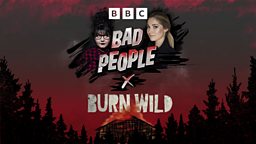
Burn Wild
To explore this topic, on the most recent crossover episode of our podcast Bad People, Sofie Hagen and I speak with Georgia Catt, the producer of the new Βι¶ΉΤΌΕΔ Sounds podcast Burn Wild.
Burn Wild follows an underground group of radical environmentalists. It is an inside look at the secretive world of the Earth Liberation Front (ELF) and the Animal Liberation Front (ALF). These organisations, which were particularly active in the 1990s, sounded environmental alarms which are still ringing.
Rather than soup and superglue, the ELF and ALF activists interviewed on Burn Wild went a lot further, including burning down buildings. They were called “eco-terrorists”. And the podcasts drills deep into that question: how far is too far to go to stop the planet burning?
Exactly whether, or when, environmental activists cross ethical lines is subjective, and has been heavily politicised.
Criminals?
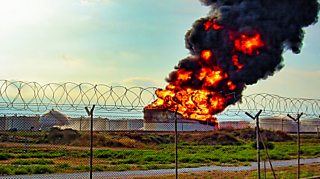
For example, in 2020 the Βι¶ΉΤΌΕΔ Secretary at the time, Priti Patel, called Extinction Rebellion “so-called eco-crusaders turned criminals”.
The 2022 Public Order Bill treats common environmental protest acts as “guerrilla tactics”. If the Bill becomes law, it will criminalise the tactic used by the soup-can activists called “locking-on”. It is a popular tactic whereby people glue themselves to others, objects, or buildings, to cause disruption.
As we discuss with the producer of Burn Wild, those who become environmental activists typically already feel like the government is failing the planet. When petitions and legal pathways have been exhausted, what else should people do to raise the alarm?
Psychologically speaking, one factor that also influences where we draw the line between acceptable and unacceptable environmental action is our own fears for the future.
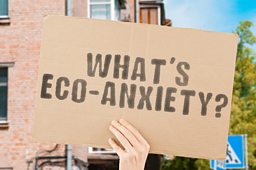
Eco-Anxiety
In 2021 Australian social psychologist Teaghan Hogg refined a scale to measure just how much environmental fears are impacting us.
The 13-item Eco-anxiety Scale includes items that measure whether you have been unable to stop thinking about climate change, losses to the environment, or felt anxious about your personal responsibility to help address eco issues.
While eco-anxiety can be debilitating for some, it has been called a functional anxiety. In other words, it motivates us to behave in environmentally friendly ways. It is a helpful, even crucial, emotion in the fight to hit our climate targets.
Whatever you think about the soup-throwing activists, listen to the most recent episode of Bad People to test your eco-ethics limits. You’ll also learn about the shady origin of the concept of “eco-terrorism”, the new proposed international legal prohibition against “ecocide”, and hear fascinating insights from the ELF and ALF activists who broke the law to be heard.
You can also listen to the Burn Wild on Βι¶ΉΤΌΕΔ Sounds - a story of two fugitive environmentalists, an eco-terrorist cell and a burning question: How far is too far to go to save the planet?

Bio
Dr Julia Shaw is a research associate at University College London and the co-host of the Bad People podcast on Βι¶ΉΤΌΕΔ sounds.
She is an expert on criminal psychology, and the author of three books: “Bi: The hidden history, culture, and science of bisexuality”, “Making Evil: The Science Behind Humanity’s Dark Side”, and “The Memory Illusion: Remembering, Forgetting, and the Science of False Memory”.
Her website: , and twitter
